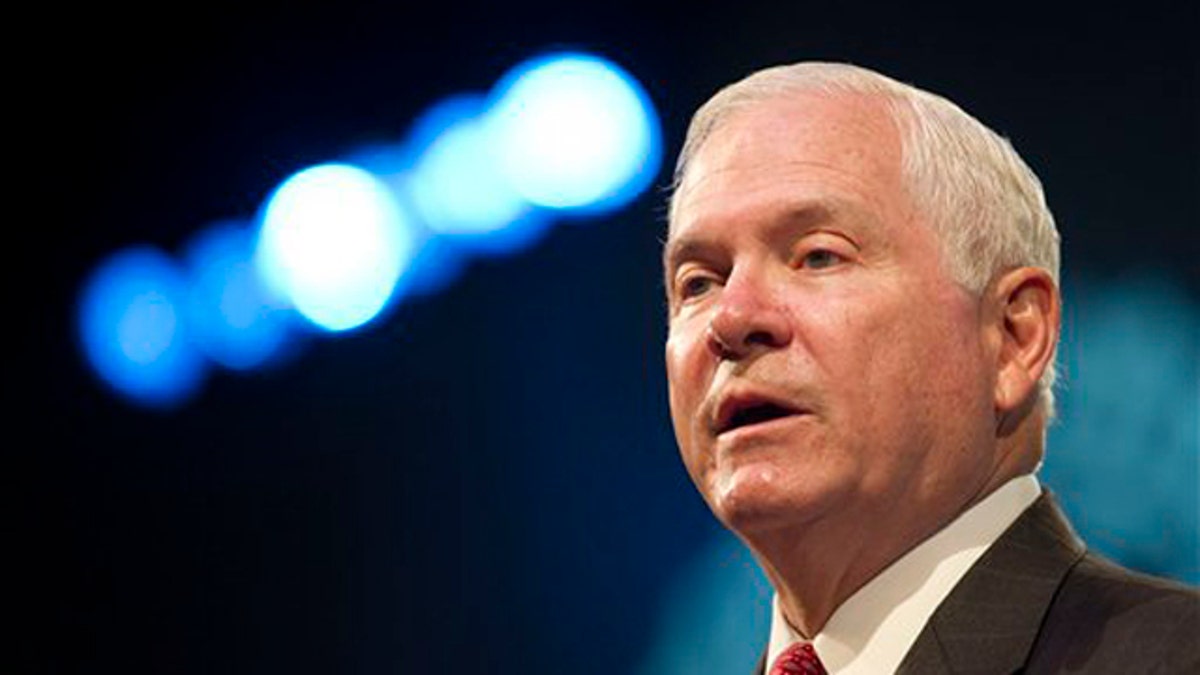
FILE: Aug. 31, 2010: Secretary of Defense Robert Gates speaks at the American Legion convention in Milwaukee, Wis. (AP)
RAMADI, Iraq -- Marking the formal end of the United States' combat mission in Iraq, Defense Secretary Robert Gates suggested Wednesday that even if the war-torn country emerges from the chaos and upheavals of recent years in a way that favors U.S. interests, the venture will always be "clouded" by the faulty intelligence the Bush administration cited to make the initial case for war.
"The problem with this war for, I think, many Americans is that the premise on which we justified going to war proved not to be valid -- that is, Saddam (Hussein) having weapons of mass destruction," Gates told reporters after meeting with troops at Camp Ramadi in al-Anbar province. "Even if the outcome (of the war) is a good one from the standpoint of the United States, it will always be clouded by how it began."
More than seven years after Bush launched the Iraq war and toppled the Hussein regime in Baghdad, the U.S. mission on Sept. 1 officially changed, from Operation Iraqi Freedom to Operation New Dawn.
Asked Wednesday if the U.S. is still at war in Iraq, Secretary Gates replied: "No, I would say we're not."
The secretary and a series of uniformed commanders made available to reporters for questioning here all emphasized that the fewer than 50,000 American troops now left in Iraq -- down from a peak force of 170,000 -- are engaged only in an "advise and assist" mission, in which their core function is to continue training and "mentoring" Iraqi security forces.
Under an agreement signed by the Iraqi government and the Bush administration in 2008, the remaining 50,000 troops are to leave Iraq by the end of 2011 -- at which point, Gates told an audience of more than 300 soldiers at Camp Ramadi, the U.S. will maintain "a zero presence, other than just a regular kind of military assistance office like we've got in virtually every other country in the world."
A number of Iraqi leaders -- anxiously awaiting the formation of a new government, more than five months after national elections produced a narrow victory for one Shiite coalition over another -- have suggested they might wish to see some number of U.S. troops remain in the country after 2011.
That would require the revision of the Status of Forces Agreement the two governments signed in 2008.
"Whether or not the question is reopened about whether we have some kind of a presence after (2011)," Gates told an inquiring soldier during a question and answer session, "I think will have to await the formation of an Iraqi government."
He added that any such proposal "will have to be at the initiative of the new Iraqi government, and we would obviously be willing to look at that."
Asked later by a reporter if the Iraq war -- which claimed some 4,400 American lives and possibly 100,000 Iraqis -- was "worth it," the secretary sought refuge in ambiguity.
"It really requires a historian's perspective," Gates said, minutes after awarding the Purple Heart to Army Specialist Shawn M. Mason, a 20-year-old soldier from New Cumberland, Pa., who suffered shrapnel wounds to his face and elbow when his convoy was ambushed outside Fallujah.
"If Iraq ends up a democratic country that is a constructive participant in international life, then I think, looking back -- although the cost of getting there would have been terrible, as I said yesterday -- the potential for it being the core of significant change in this whole region, as a democratic state, I think is hard to underestimate.
"Our men and women in uniform," he continued, "believe we have accomplished something that makes the bloodshed not to have been in vain."
Notably, Gates did not say he personally believes the war to have been "worth it," but rather ascribed that sentiment to rank and file soldiers. Questioned about this later, a spokesman for the secretary said the views Gates was attributing to the troops are shared by the secretary as well.
Later, Gates and his top field commanders were to join Vice President Biden and Iraqi military officers at a change of command ceremony, which was to be held inside a palace on the grounds of the Victory Base Compound in Baghdad.












































